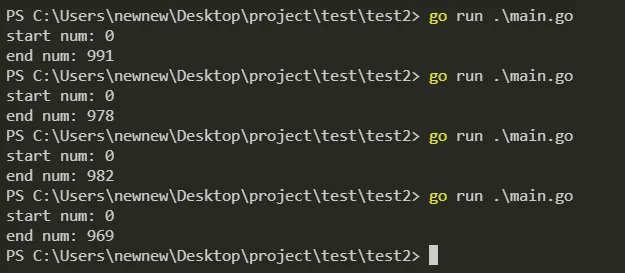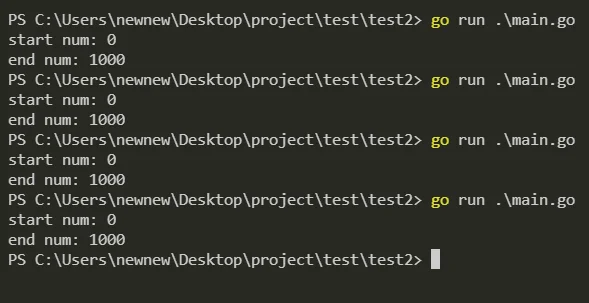什么是原子操作?
原子操作是不可分割的,在执行完毕之前不会被任何其它任务或事件中断。在单处理器系统(UniProcessor)中,能够在单条指令中完成的操作都可以认为是" 原子操作",因为中断只能发生于指令之间。
硬件支持
原子性不可能由软件单独保证--必须需要硬件的支持,因此是和架构相关的。在x86 平台上,CPU提供了在指令执行期间对总线加锁的手段。CPU芯片上有一条引线#HLOCK pin,如果汇编语言的程序中在一条指令前面加上前缀"LOCK",经过汇编以后的机器代码就使CPU在执行这条指令的时候把#HLOCK pin的电位拉低,持续到这条指令结束时放开,从而把总线锁住,这样同一总线上别的CPU就暂时不能通过总线访问内存了,保证了这条指令在多处理器环境中的原子性。
--- 取至百度百科
小结
资源在在进行原子操作时,其他线程、协程不能同时对该资源进行操作;
**go version go1.16.3 windows/amd64**// Copyright 2011 The Go Authors. All rights reserved.
// Use of this source code is governed by a BSD-style
// license that can be found in the LICENSE file.
// Package atomic provides low-level atomic memory primitives
// useful for implementing synchronization algorithms.
//
// These functions require great care to be used correctly.
// Except for special, low-level applications, synchronization is better
// done with channels or the facilities of the sync package.
// Share memory by communicating;
// don't communicate by sharing memory.
//
// The swap operation, implemented by the SwapT functions, is the atomic
// equivalent of:
//
// old = *addr
// *addr = new
// return old
//
// The compare-and-swap operation, implemented by the CompareAndSwapT
// functions, is the atomic equivalent of:
//
// if *addr == old {
// *addr = new
// return true
// }
// return false
//
// The add operation, implemented by the AddT functions, is the atomic
// equivalent of:
//
// *addr += delta
// return *addr
//
// The load and store operations, implemented by the LoadT and StoreT
// functions, are the atomic equivalents of "return *addr" and
// "*addr = val".
//
package atomic
import (
"unsafe"
)
// BUG(rsc): On 386, the 64-bit functions use instructions unavailable before the Pentium MMX.
//
// On non-Linux ARM, the 64-bit functions use instructions unavailable before the ARMv6k core.
//
// On ARM, 386, and 32-bit MIPS, it is the caller's responsibility
// to arrange for 64-bit alignment of 64-bit words accessed atomically.
// The first word in a variable or in an allocated struct, array, or slice can
// be relied upon to be 64-bit aligned.
// SwapInt32 atomically stores new into *addr and returns the previous *addr value.
func SwapInt32(addr *int32, new int32) (old int32)
// SwapInt64 atomically stores new into *addr and returns the previous *addr value.
func SwapInt64(addr *int64, new int64) (old int64)
// SwapUint32 atomically stores new into *addr and returns the previous *addr value.
func SwapUint32(addr *uint32, new uint32) (old uint32)
// SwapUint64 atomically stores new into *addr and returns the previous *addr value.
func SwapUint64(addr *uint64, new uint64) (old uint64)
// SwapUintptr atomically stores new into *addr and returns the previous *addr value.
func SwapUintptr(addr *uintptr, new uintptr) (old uintptr)
// SwapPointer atomically stores new into *addr and returns the previous *addr value.
func SwapPointer(addr *unsafe.Pointer, new unsafe.Pointer) (old unsafe.Pointer)
// CompareAndSwapInt32 executes the compare-and-swap operation for an int32 value.
func CompareAndSwapInt32(addr *int32, old, new int32) (swapped bool)
// CompareAndSwapInt64 executes the compare-and-swap operation for an int64 value.
func CompareAndSwapInt64(addr *int64, old, new int64) (swapped bool)
// CompareAndSwapUint32 executes the compare-and-swap operation for a uint32 value.
func CompareAndSwapUint32(addr *uint32, old, new uint32) (swapped bool)
// CompareAndSwapUint64 executes the compare-and-swap operation for a uint64 value.
func CompareAndSwapUint64(addr *uint64, old, new uint64) (swapped bool)
// CompareAndSwapUintptr executes the compare-and-swap operation for a uintptr value.
func CompareAndSwapUintptr(addr *uintptr, old, new uintptr) (swapped bool)
// CompareAndSwapPointer executes the compare-and-swap operation for a unsafe.Pointer value.
func CompareAndSwapPointer(addr *unsafe.Pointer, old, new unsafe.Pointer) (swapped bool)
// AddInt32 atomically adds delta to *addr and returns the new value.
func AddInt32(addr *int32, delta int32) (new int32)
// AddUint32 atomically adds delta to *addr and returns the new value.
// To subtract a signed positive constant value c from x, do AddUint32(&x, ^uint32(c-1)).
// In particular, to decrement x, do AddUint32(&x, ^uint32(0)).
func AddUint32(addr *uint32, delta uint32) (new uint32)
// AddInt64 atomically adds delta to *addr and returns the new value.
func AddInt64(addr *int64, delta int64) (new int64)
// AddUint64 atomically adds delta to *addr and returns the new value.
// To subtract a signed positive constant value c from x, do AddUint64(&x, ^uint64(c-1)).
// In particular, to decrement x, do AddUint64(&x, ^uint64(0)).
func AddUint64(addr *uint64, delta uint64) (new uint64)
// AddUintptr atomically adds delta to *addr and returns the new value.
func AddUintptr(addr *uintptr, delta uintptr) (new uintptr)
// LoadInt32 atomically loads *addr.
func LoadInt32(addr *int32) (val int32)
// LoadInt64 atomically loads *addr.
func LoadInt64(addr *int64) (val int64)
// LoadUint32 atomically loads *addr.
func LoadUint32(addr *uint32) (val uint32)
// LoadUint64 atomically loads *addr.
func LoadUint64(addr *uint64) (val uint64)
// LoadUintptr atomically loads *addr.
func LoadUintptr(addr *uintptr) (val uintptr)
// LoadPointer atomically loads *addr.
func LoadPointer(addr *unsafe.Pointer) (val unsafe.Pointer)
// StoreInt32 atomically stores val into *addr.
func StoreInt32(addr *int32, val int32)
// StoreInt64 atomically stores val into *addr.
func StoreInt64(addr *int64, val int64)
// StoreUint32 atomically stores val into *addr.
func StoreUint32(addr *uint32, val uint32)
// StoreUint64 atomically stores val into *addr.
func StoreUint64(addr *uint64, val uint64)
// StoreUintptr atomically stores val into *addr.
func StoreUintptr(addr *uintptr, val uintptr)
// StorePointer atomically stores val into *addr.
func StorePointer(addr *unsafe.Pointer, val unsafe.Pointer)
Demo
演示下原子操作的,使用效果
未使用 sync/atomic
package main
import (
"fmt"
"sync"
)
var num int32
var wg sync.WaitGroup
func main() {
fmt.Println("start num:", num)
for i := 0; i < 1000; i++ { // 这里是为演示效果 开了1000个goroutine
wg.Add(1)
go addOne()
}
wg.Wait()
fmt.Println("end num:", num)
}
func addOne() {
num++
wg.Done()
}
运行结果:
num的最终值不符合预期,且每次还不一样;
这个就是资源竞争(data race)导致的了.

使用 sync/atomic
package main
import (
"fmt"
"sync"
"sync/atomic"
)
var num int32
var wg sync.WaitGroup
func main() {
fmt.Println("start num:", num)
for i := 0; i < 1000; i++ {// 这里是为演示效果 开了1000个goroutine
wg.Add(1)
go addOne()
}
wg.Wait()
fmt.Println("end num:", num)
}
func addOne() {
atomic.AddInt32(&num, 1)
wg.Done()
}
运行结果
num结果值符合预期;

